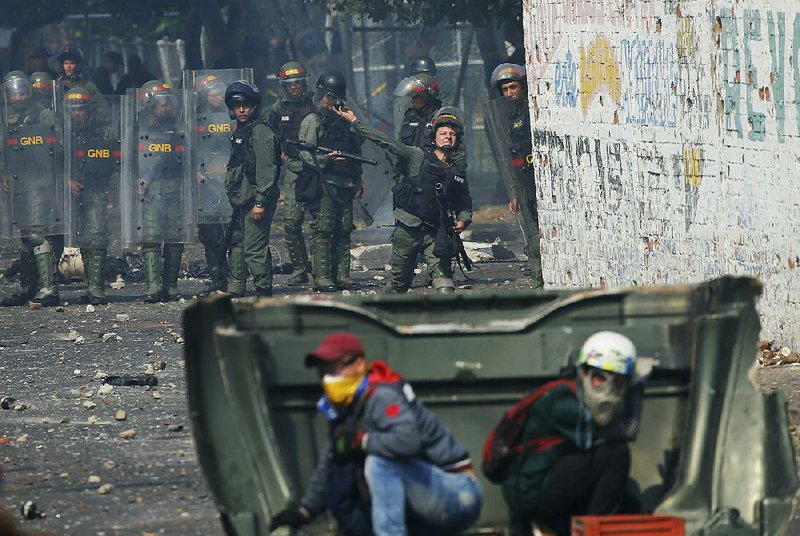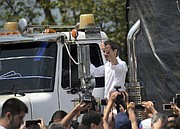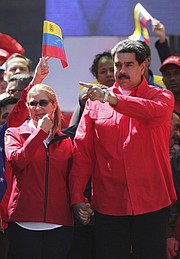CUCUTA, Colombia -- Opponents of Venezuelan President Nicolas Maduro faced tear gas Saturday as they rescued boxes of emergency food and medicine from burning trucks during violent clashes on the Colombian border with security forces blocking the entry of U.S.-supplied humanitarian aid.
The panicked scene Saturday on the binational Santander Bridge was part of the drama on a day in which two people were killed in unrest near Brazil and at least 23 soldiers switched loyalties to opposition leader Juan Guaido. In the meantime, Maduro broke off diplomatic relations with Colombia in the increasingly unpredictable struggle for power in the oil-rich South American nation.
For weeks, the opposition has been amassing aid on three of Venezuela's borders with the aim of starting a "humanitarian avalanche" one month after Guaido declared himself interim president in a direct challenge to Maduro's rule.
In defiance of a ban against leaving the country, Guaido made a secret trip Friday to Colombia to lead the aid effort and meet with regional leaders. He suggested the Venezuelan armed forces had helped spirit him across his nation's western frontier.
But he was also running the risk of being barred from re-entry or arrested upon return.
Even as the 35-year-old lawmaker has won the backing of more than 50 governments around the world, he's so far been unable to cause a major rift inside the military -- the socialist leader's last-remaining plank of support in a country ravaged by hyperinflation and widespread shortages.
"Our call to the armed forces couldn't be clearer: Put yourself on the right side of history," Guaido said in an appeal to troops as he pulled himself onto a truck and shook hands with its driver during a ceremonial send-off of the aid convoy from the Colombian city of Cucuta.
But almost as soon as the aid convoy departed, the limitations of Guaido's high-stakes gamble became clear.
At the Santander Bridge, activists led by exiled lawmakers escorted three flatbed trucks of aid past the halfway point into Venezuela before they were repelled by security forces firing tear gas and buckshot. In a flash the cargo caught fire, with some eyewitnesses claiming the National Guardsmen doused a tarp covering the boxes with gas before setting it on fire. With a black cloud rising above, the activists -- protecting themselves from the fumes with vinegar-soaked cloths -- unloaded the boxes by hand in a human chain stretching back to the Colombian side of the bridge.
"They burned the aid and fired on their own people," said David Hernandez, 39, who was hit in the forehead with a tear gas canister that left a bloody wound and growing welt. "That's the definition of dictatorship."
He said he decided to join Saturday's protest thinking of his father, who is dying from bone cancer that can't be treated because of Venezuela's shortages.
Guaido plans to meet Monday with Vice President Mike Pence during an emergency gathering of foreign ministers from the so-called Lima Group of mostly conservative Latin American nations. The meeting in Colombia's capital, Bogota, was organized to discuss Venezuela's crisis.
TRUCKS STRANDED
Earlier Saturday, on the borders with Colombia and Brazil, opposition protesters waved banners and chanted anti-government slogans as they waited to escort trucks full of aid across several bridges into Venezuela.
Two pickups of aid crossed into Venezuela from the Brazilian town of Pacaraima in that country's north, in what opposition figures said was a small but symbolic puncture of Maduro's pledge to keep unauthorized assistance out.
"We did it," said Maria Teresa Belandria, who is the Brazil envoy of Guaido. "This is a major victory."
But as of Saturday night, the trucks remained stranded on the border, according to Jesus Bobadillo, a Catholic priest in Pacaraima.
"This whole thing has failed," Bobadillo said Saturday night, lamenting that with the borders shut, the crisis could worsen for the neediest people. "The drama of hunger and lack of medicine continues, but now it's even worse because at least before, people had an escape valve."
During the aid push, Maduro struck back, breaking diplomatic relations with Colombia, whose government he accuses of serving as a staging ground for a U.S.-led effort to oust him from power.
"My patience has run out," Maduro said, speaking Saturday at a rally of red-shirted supporters in Caracas and giving Colombian diplomats 24 hours to leave the country.
"We can't keep putting up with the Colombian territory being used for attacks against Venezuela," Maduro said. "For that reason, I have decided to break all political and diplomatic relations with Colombia's fascist government."
The White House condemned the use of force by Maduro's government, warning that rights violations "will not go unpunished," and urging the military to "uphold its constitutional duty to protect the citizens of Venezuela" and allow aid to enter the country.
'THERE'S NO BREAD'
The clashes started at dawn in the Venezuelan border town of Urena, when residents began removing yellow metal barricades and barbed wire blocking the Santander Bridge into Colombia. Some of the protesters were masked youths who threw rocks and later commandeered a city bus and set it afire. At least two dozen people were injured in the disturbances, according to health officials.
"We're tired. There's no work, nothing," Andreina Montanez, 31, said as she sat on a curb recovering from the sting of tear gas used to disperse the crowd.

A single mother, she said she lost her job as a seamstress in December and had to console her 10-year-old daughter's fears that she would be left orphaned when she decided to join Saturday's protest.
"I told her I had to go out on the streets because there's no bread," she said. "But still, these soldiers are scary. It's like they're hunting us."
Maria Zambrano, 46, an engineer, also joined the aid effort in Urena.
"They think they are the owners of Venezuela," Zambrano said of the guards. She said a cousin of hers with cancer cannot find medication for treatment. "But we are all united, and we will get this aid in. They won't be able to shoot us all."
At the Simon Bolivar Bridge, another crossing into Colombia, volunteers in blue vests calmly walked up to a police line and shook officers' hands, appealing for them to join their fight.
But the goodwill was fleeting and a few hours later the volunteers were driven back with tear gas, triggering a chaotic stampede.
At least 23 members of the National Guard deserted at the Simon Bolivar Bridge and took refuge inside Colombia, according to migration officials.
A video provided by Colombian authorities shows three soldiers at the bridge wading through a crowd with their assault rifles and pistols held above their heads in a sign of surrender. The young soldiers were then ordered to lie facedown on the ground as migration officials urged angry onlookers to keep a safe distance.
"I've spent days thinking about this," said one of the soldiers, whose identity was not immediately known. He called on his comrades to join him: "There is a lot of discontent inside the forces, but also lots of fear."
Guaido, who has offered amnesty to soldiers who join the opposition's fight, applauded their bravery, saying it was a sign that support for Maduro was crumbling. Later, he greeted five of the military members, who in turn offered a salute, calling the opposition leader Venezuela's "constitutional president" and their commander in chief.
"They aren't deserters," Guaido said. "They've decided to put themselves on the side of the people and the constitution. ... The arrival of liberty and democracy to Venezuela can't be detained."
CONCERT, RALLIES
International leaders including U.N. Secretary-General Antonio Guterres are appealing for the sides to avoid violence.
But at least two people were killed and another 18 injured Saturday in the town of Santa Elena de Uairen, near the border with Brazil, according to health officials. The town was also the site of deadly disturbances a day earlier when members of the indigenous Pemon tribe clashed with security forces.
The push to get the humanitarian aid in comes on the heels of a concert organized by British billionaire Richard Branson aimed at pressuring Maduro to accept the aid. Tens of thousands of Venezuelans gathered in a field to hear pop stars like Juanes sing beneath a scorching sun. Guaido made a surprise appearance toward the end.
Dueling demonstrations took place in the capital. Government opponents headed toward an air base. With the opposition mostly mobilized along the border, a much larger mass of red-shirted government supporters, some of them on motorcycles, filed downtown toward the presidential palace.

Venezuela's military has served as the traditional arbiter of political disputes in the South American country, and in recent weeks, top leaders have pledged their unwavering loyalty to Maduro. However, many believe that lower-ranking troops who suffer from the same hardships as many other Venezuelans may be more inclined to now let the aid enter.
Opposition leaders are pushing forward in belief that whether or not Maduro eventually lets the aid in, he will come out weakened. They also contend that if the military does allow the food and medical gear to pass, it will signify troops are now loyal to Guaido.
Analysts warn that there may be no clear victor and humanitarian groups have criticized the opposition as using the aid as a political weapon.
"I don't know that anyone can give a timeline of when the dam might break," said Eric Farnsworth of the Council of the Americas and Americas Society, a Washington-based think tank. "And it's quite possible that it won't."
Information for this article was contributed by Christine Armario, Luis Andres Henao, Joshua Goodman and Scott Smith of The Associated Press; by Dylan Baddour, Anthony Faiola and Mariana Zuniga of The Washington Post; and by Nicholas Casey, Albinson Linares and Anatoly Kurmanaev of The New York Times.
A Section on 02/24/2019


